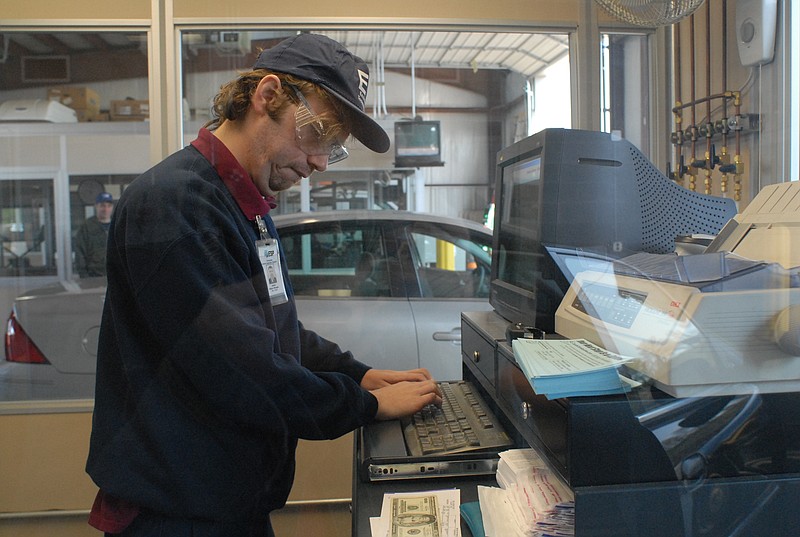It's difficult to get around the stark truth of vehicle emissions testing. For whatever difference it has made in the air quality of Hamilton County, its costs hurt those who can least afford it the most.
That's one reason two Chattanooga legislators have introduced a bill in the General Assembly to end emissions testing in the counties where it was introduced between 1985 and 2005.
"So, in many ways," said Sen. Bo Watson, R-Hixson, who is sponsoring the bill with Rep. Mike Carter, R-Ooltewah, "I would argue [if we pass the bill] we're removing a burden from some citizens who have less capability to pay to get their car fixed."
If the proper t's can be crossed and the i's dotted, where the counties (including Hamilton) are not facing any type of sanctions from the federal Environmental Protection Agency (EPA), we would be supportive of the legislation.
After all, anyone unable to replace one car with another every couple of years probably has an emissions testing story:
» My car is running perfectly, but it failed the emissions test.
» My mechanic can't find any reason my car should have failed the emissions test.
» My car failed the emissions test, had $997.34 worth of work and failed the test again.
» My car has had work twice, costing me nearly $2,000, and it still failed. I don't have any more money to pay for repairs.
» My brother-in-law registered his beater car as an antique, so he doesn't have to have it tested.
» My neighbor has a 1974 Ford Maverick that smokes like a coal furnace, and cars that old don't have to be tested.
Watson and Carter believe the emissions testing can end because the entire state now complies with federal air quality health standards.
In 1990, the Federal Clean Air Act had required Tennessee to develop more restrictive regulations to control air pollution from mobile sources in counties that were not meeting the federal standards for air quality. When Hamilton County's air quality was tested in 2004, it did not meet the federal standard and emissions testing was introduced.
But the Tennessee Department of Environment and Conservation (TDEC), over the past two years, has declared the state has "attained" compliance for standards for particle pollution and for smog.
However, critics of the bill say the six counties in which emissions testing is done are still subject to a State Implementation Plan, which must be approved by the EPA and is enforceable by the federal agency. To change that, they say, the county would have to have some other way or ways in which pollution components are reduced to exchange for what will be lost if the emissions testing goes away.
Knoxville, for instance, doesn't have emissions testing but meets federal clean air standards through other methods.
Currently, officials say, automobile emissions repairs keep cars from adding to the nitrogen dioxide and volatile organic compounds in the air.
Hamilton County officials agreed to bring the county into compliance with federal clean air standards in 2005 by creating a seasonal open-burning ban, lowering speed limits for trucks and implementing emissions testing.
Local officials also fretted at the time a lack of compliance could risk the county losing federal economic development funding. At the time, the county was attempting to market its Enterprise South land to manufacturers, and especially to automobile manufacturers.
"Not only will this improve the health of our citizens," Bob Colby, then and now director of the Chattanooga-Hamilton County Air Pollution Control Bureau, said in 2005, "it will improve the chances of future economic growth."
In 2008, the county did land the Volkswagen manufacturing plant, and the road to the plant through Enterprise Park was paid for by 80 percent in federal funds, according to Times Free Press archives.
But those against emissions testing at its start and today say out-of-state cars, and especially tractor-trailer trucks, get off scot-free while the burden is borne by county residents. Opponents also blame logjams like the I-24/I-75 and I-24/U.S. 27 splits, where more pollutants are emitted while cars are standing still than they would if traffic flowed freely. Plans are in the works to alleviate both interchanges, but it may be a decade before the county sees any improvement there.
If legislators are able to determine the state can clear all EPA hurdles without the emissions testing centers, or if different off-sets can be determined that would make up for the pollutants repaired cars represent, then the testing centers will no longer need to be an unnecessary burden on the county residents who can least afford repairs on their cars.
In short, we believe the job of crossing t's and dotting i's must occur first.
